 Written by Mike Price, OT
Written by Mike Price, OT
Regardless of physical ability, everyone can enjoy the benefits of physical activity. As an exercise, cycling contributes to improved cardiovascular health, increased muscle mass, improved coordination, and weight loss. For an adult with strength, balance, or mobility challenges, the stability and comfort of an adult trike provide the opportunity to reap the benefits of cycling, without much of the tip-risk associated with a conventional two-wheeled bike. Let's learn about how to choose the best adult tricycle!
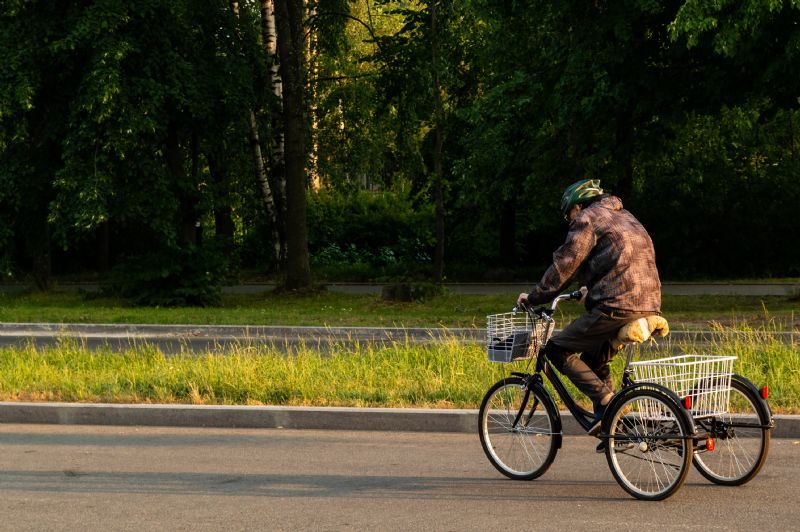
Like cars, trikes have gears that determine how fast they can go and how easy it will be to travel on certain terrains.
All adult trikes are great on smooth paved surfaces. Because upright models are top-heavy, they don’t do well on hard corners, while recumbent models have a lower center of gravity and can take turns better. For going off-pavement, there are specific “all-terrain” models in every style with heavy-duty frames and bigger tires.
Some adult tricycles come fully assembled, some come unassembled, and some come needing some assembly that may or may not require tools.
The wheel size generally determines the size of an adult trike. Wheel diameters range from 16 inches in smaller foldable models to 20, 24, and 26 inches in standard and bariatric models. Tricycles with 24-inch wheels are best for riders between 4 feet 8 inches and 5 feet 5 inches tall, while those with 26-inch wheels are best for riders between 5 feet 4 inches and 6 feet 2 inches tall. Larger wheels roll over uneven surfaces easier than smaller wheels, and larger wheels also provide a more cushioned ride than smaller wheels.
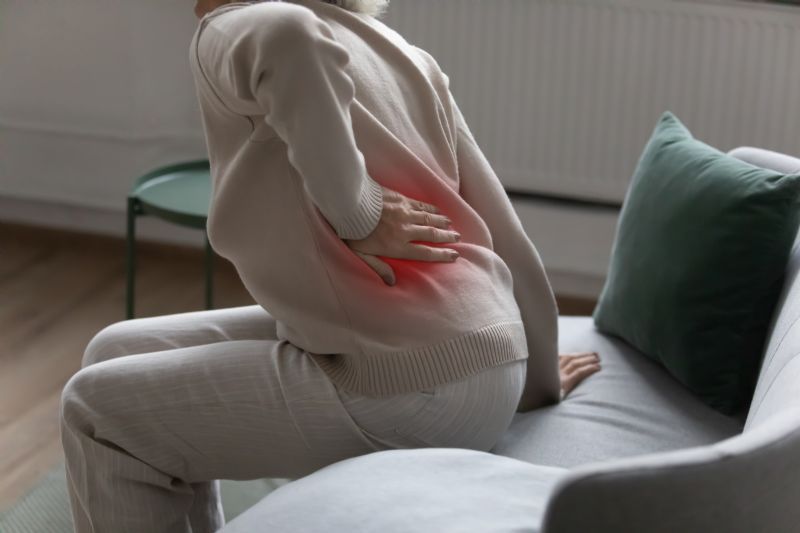
Lower back pain is a leading cause of disability, and seats with back support can make cycling easier and healthier for trike riders. Saddle seats can come with backrests or have them installed as accessories. Higher back seats on semi-recumbent bikes and up to full-height seats on recumbent bikes make trike riding easier for users and reduce the risk of back pain while riding.
The step-through frame of adult trikes means you don’t have to lift your leg high over a bar or seat to get on the bike. You can “step through” the frame and have a foot on the ground on either side of the trike without any effort.
Some adult trikes have baskets in the front, some are located in the rear, and some models have them in the front and back. Hauling trikes can carry heavy loads in their baskets, or tow a utility wagon.
Customizing your adult tricycle is easy with options including extra storage bags or baskets, canopies, safety flags, horns, cell phone holders, rearview mirrors, trike covers, and lights for the wheels.
Adult tricycles, also called adult trikes, three-wheeled bikes, and adaptive tricycles, are three-wheeled self-propelled cycles that are a great option for people who have balance or coordination issues but maintain the ability to perform the pedaling and braking required for a trike. They generally have an upright sitting position and three large wheels, one in front and two in back.
Adult trikes allow individuals with strength, balance, and mobility issues to enjoy the same physical benefits as other trikers and cyclists. Adult tricycles deliver low-impact workouts that are easier on the bones and joints, so riders can get the benefits of cardio workouts without the fall risk or bone and joint strain. Adult trikes provide the opportunity to improve strength, flexibility, mobility, posture, and coordination.
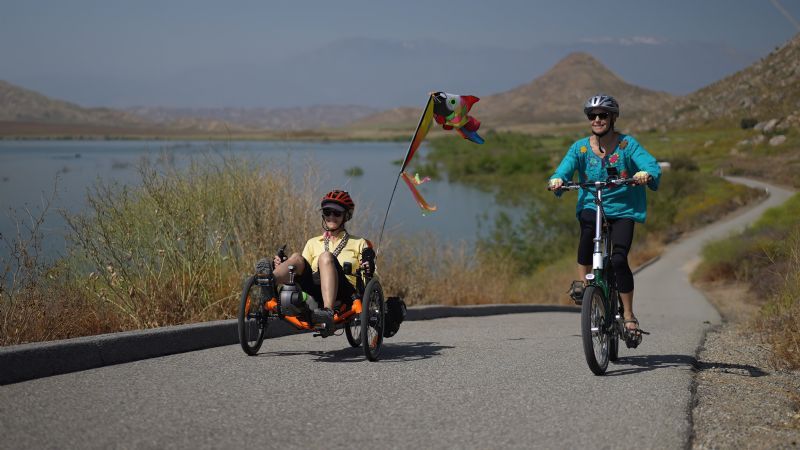
The balance provided by an adult trike’s three wheels greatly reduces the risk of tipping and falling that is present when riding a regular two-wheeled bike. The seating options are much more comfortable, and trikes can relieve, rather than exacerbate, the lower back pain that often accompanies bike riding.
Trikes are sized according to their wheels. Small wheels could help the rider get on or off, depending on the rider's height. Larger wheel sizes generally aid in riding longer distances and carrying heavier loads. The seat height and handlebar adjustment will have the most impact on sizing for a rider. Questions to ask when sizing your adult trike are how easy it will be for you to get on and off, how low or high the seat goes, how adjustable are the handlebars, and how are your legs positioned while pedaling.
Adult trikes are great for seniors, as they are extremely stable and don’t require the same balance, strength, or coordination as two-wheeled bikes.
Yes! Tricycles provide the opportunity for a great cardio workout along with improving strength, flexibility, mobility, posture, and coordination.
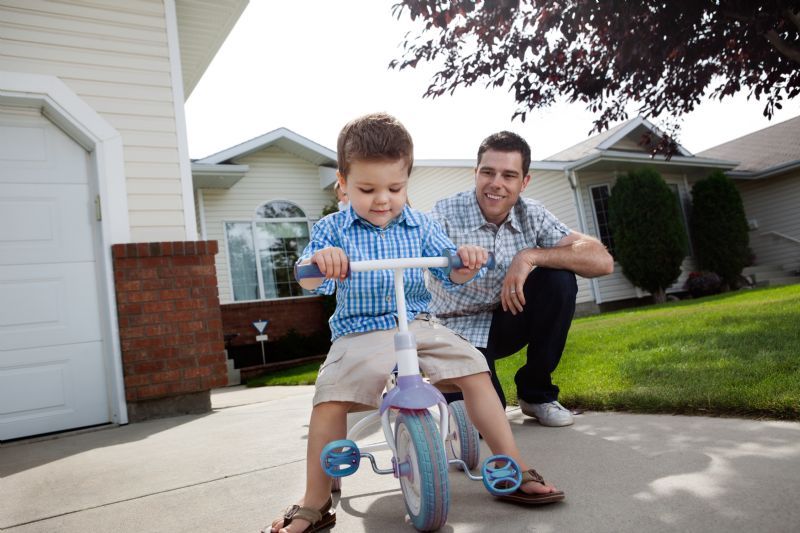
For adults with impaired balance, the stability and balance provided by the three-wheeled trike make it easy to stay upright. Even when at a standstill, the bike does not need to be balanced by the rider. Adult tricycles are also beneficial for those with a limited range of motion, as they are lower to the ground and their dropdown frames make getting on and off easy. Hills are easier to climb on a trike because the rider isn’t required to maintain the same forward motion to stay upright as is necessary on a two-wheeled bike. Trike seats are also designed to distribute the rider’s weight to reduce pressure, making them more comfortable for aging riders than traditional bike seats.
An adaptive tricycle meets the definition of Durable Medical Equipment if it is prescribed by your doctor as medically justified and goes through the prior approval process for Medicare coverage.
The main considerations when purchasing an adult trike are its seat style and handlebar type. Below, we will explain all the seat positions, handlebar types, and other important features to consider!
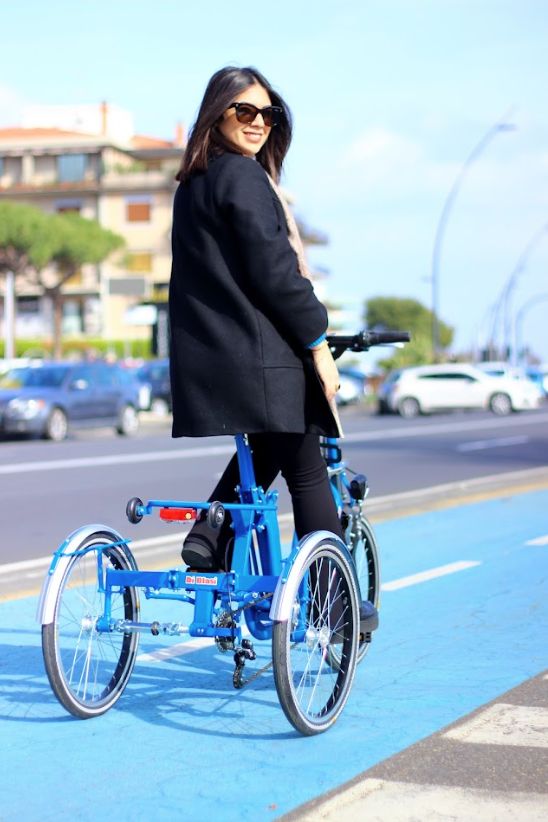
Except for the extra rear wheel, upright adult tricycles are similar to standard bikes. They look like the trikes most people think of for children, only bigger. A rider mounts and dismounts easily with the step-through frame, and is seated in an upright position while riding. These adult tricycles often come with baskets for carrying things, so they’re great for running around town, but they’re not designed for cycling as a sport.
Best Upright Tricycle: Di Blasi R34 5-Speed Folding Electric Tricycle
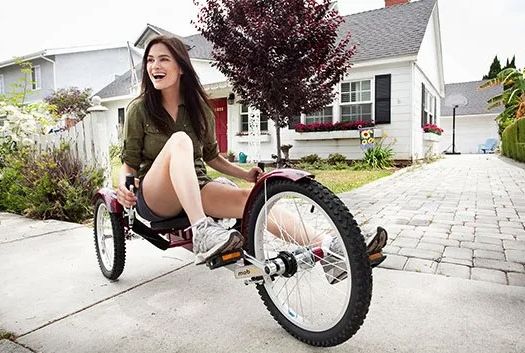
A semi-recumbent bike is perfect for taller people or anyone who finds it difficult to pedal a standard adult trike but needs to not be as low to the ground as a fully recumbent trike. This design offers the stability of an upright tricycle with easier pedaling and steering since the seat is located farther back. Most riders will find this design comfortable and user-friendly, and these adult trikes are less likely to cause back pain than upright models and can accommodate higher weight limits.
Best: Mobo Shift Reversible Cruiser
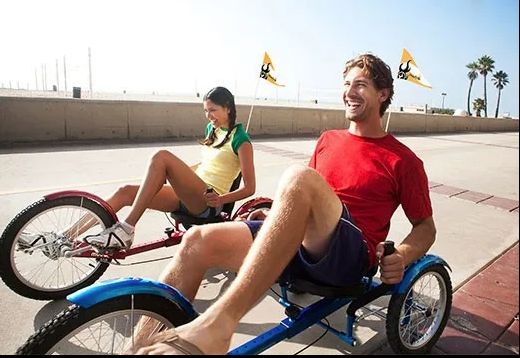
On a recumbent trike, the rider sits low to the ground in a reclining position, with the rider’s body weight evenly distributed over a larger area. This weight distribution and support of the spine in a neutral reclined position make this style a great choice for people who suffer from back pain. There are many handlebar styles available, but instead of front-mounted handlebars, most recumbent trikes have levers on either side of the seat for steering. These trikes are low to the ground and perfect for sports biking.
Best: Mobo Triton Pro Adult Tricycle Cruiser
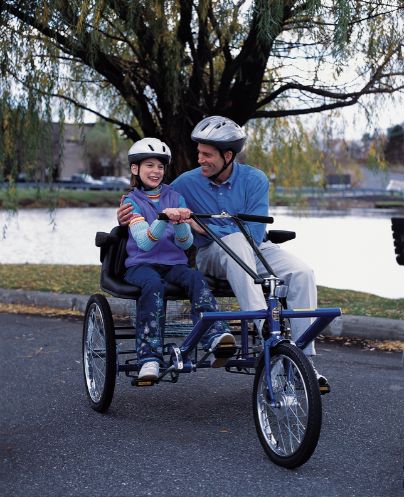
Found on most traditional bikes or trikes, standard handlebars require a good amount of upper body strength and control to operate. Their curved nature provides a natural grip and since they do come standard, they don’t cost extra to install! Keep in mind that standard handlebars don’t offer much room for different hand positioning nor are they ideal for those with limited upper body strength or mobility.
Best: Side-by-Side Therapeutic Trike - 3 Speed
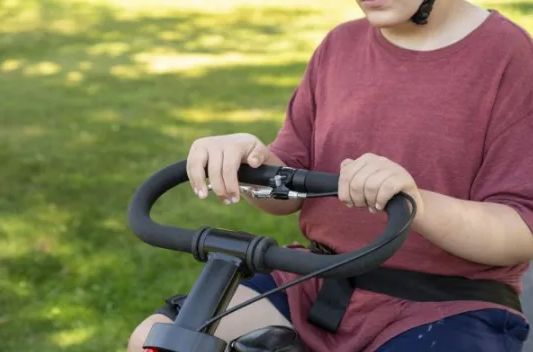
With loop-style handlebars, arm positioning and grip are much more versatile. Riders can place their palms and upper forearms flat against the loop or place their hands at the bottom of the loop for a more relaxed grip. This allows for pressure relief and comfort throughout your entire ride! Because of its versatility and slightly heavier build, loop handlebars can accommodate riders with shaky arms or unstable hands.
Adjustability and customizability are also fantastic with these bars. The sheer size of them gives riders more mounting options for lights, batteries, and other accessories. Additionally, grips and brakes can be adjusted to almost any spot to maximize performance. The Rifton R140 Large Adaptive Tricycle offers the loop style as an option and is an excellent choice for adaptability!
Best: Rifton Adaptive Tricycle for Special Needs - Large
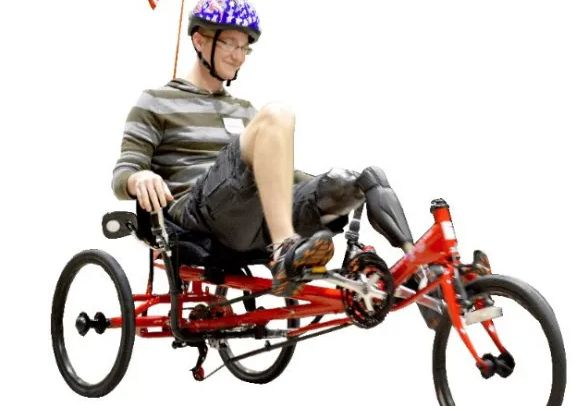
Underseat steering (USS) is Ideal for cyclists who have limited upper body mobility or those who have arm or shoulder injuries. The handlebars with USS are located under the seat with the handles positioned on either side. This allows riders to place their hands on the bars with no tension or power, making USS the most comfortable type of steering!
It is important to note that there are two types of USS: direct and indirect. With direct steering, the handlebars are directly connected to the wheels. This means you have a direct feel of the road and have total control over the wheels. With indirect steering, the handles are placed on a bearing beneath the trike seat. Essentially, it’s a little easier to maneuver than direct steering and has a really good turn radius for smaller bike paths. Both are incredibly similar but important to keep in mind for minute differences.
Best: AmTryke JT-2300 USS Recumbent Foot Cycle with Under Seat Steering
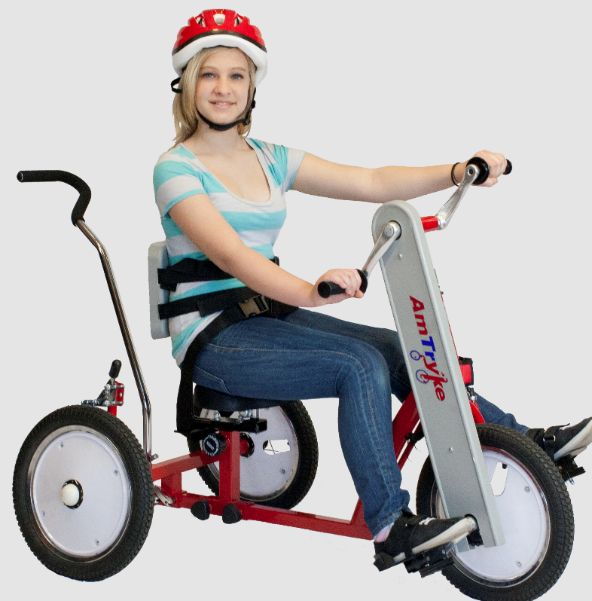
As an alternative to foot pedaling, hand pedals offer a unique and innovative way to bike. Some trikes offer both hand and foot pedals for improved strength and coordination. This particular trike also grows with the rider as it has a four-way adjustable seat: up, down, backward, and forward.
Recognized in the Paralympics, hand-cycling has opened the door to biking for those with little to no lower body strength. Hand pedals work your chest, shoulder, back, arm, and core muscles while also providing incredible cardio fitness benefits. Similar to loop bars, hand pedals have a lever-style hand brake that is easily accessible and reliable.
Best: AmTryke AM-16 Therapeutic Tricycle
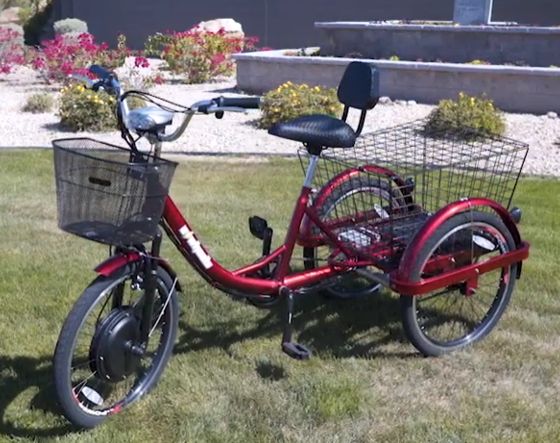
Better suited for transportation than for exercise, electric adult tricycles run on batteries to augment or replace pedal power. Trikes that can switch from manual to electric are perfect for giving you a break when you have tired out. They are great for long rides and/or riders with short-lived stamina.
Best Electric Tricycle: EWheels EW-29 Adult Electric Tricycle
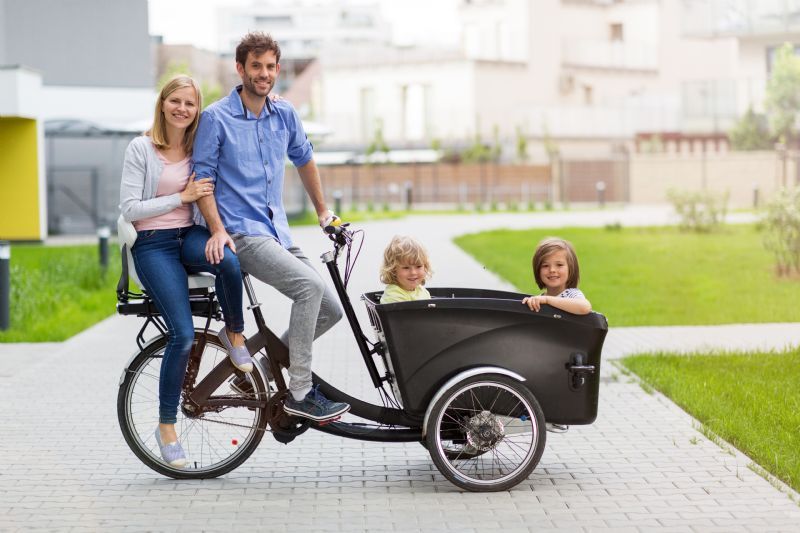
A hauler trike isn’t built for sport or fun, but it is designed to transport goods and people. Hauler trikes have a cargo area in the rear and have a higher weight capacity. Some trikes offer a big storage box as an optional upgrade.
Since physical activity is so important to overall health and well-being, it makes sense to try to find ways to stay active throughout adulthood, not just for your body, but for your brain. As people get older, and their physical abilities change, riding a three-wheeled adult tricycle accommodates a range of motion, strength, and balance challenges. Even if riding a bicycle isn’t safe or comfortable, a rider can safely work hands, legs, muscles, heart, and brain on an adult trike. Higher activity levels lead to better mobility, and trike riding is a great activity to help maintain good health and mobility.
These adult trikes, whether upright with a wide comfy seat, semi-recumbent with easier pedaling and steering, or recumbent with a posture-aligning seat, provide adults with the opportunity to enjoy cycling with the added stability of a third wheel that keeps the trike from tipping over.
The focus on rider comfort, ease of mounting and dismounting, and the balance provided by two back wheels make adult trikes a fantastic option for outdoor exercise that will help you improve and maintain your physical and mental health.
For more information on choosing the right adult trike for you, visit Caregiver University.

Co-Founder of Rehabmart and an Occupational Therapist since 1993. Mike has spent his professional career working in multiple areas of Occupational Therapy, including pediatrics, geriatrics, hand therapy, ergonomics and inpatient / outpatient rehabilitation. Mike enjoys writing articles that help people solve complex therapeutic problems and make better product choices.